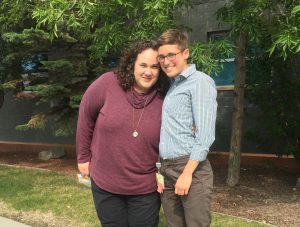“I have been called ‘it’ and wounded by people’s words more often than I care to count,” recalls Dr. Peek Ehlinger, an openly transgender resident in the Alaska Family Residency Program.
Throughout their four years of medical school in Minnesota and first year of residency in Alaska, Peek experienced many disheartening moments—as a student, as a physician, and as a patient.
“There is a lack of exposure and understanding,” Peek reflects with a deep sigh. “I have had to grow a much thicker skin.”
This experience and the experiences of LGBTQ patients in Alaska and beyond prompted Peek and a group of colleagues to develop, with support from a Pride Foundation grant, a holistic and comprehensive residency curriculum to help family practitioners better serve their LGBTQ patients.
With the goal of creating the most robust residency curriculum of its kind, few would have expected this groundbreaking resource to begin in Alaska. Medical schools in the United States currently only dedicate, on average, five hours of training focused on serving LGBTQ patients during a three-year residency. This lack of education often translates to uninformed care and—for LGBTQ patients sitting on paper-lined examination tables across the country—the impact can be deeply harmful and long-lasting.
More than half of LGBTQ people report facing discrimination from a health care provider—ranging from misgendering, to denial of service and even sexual or physical assault—and one in four transgender respondents report being completely refused medical care by a provider. As a result, nearly one quarter of transgender people report postponing necessary medical care because they fear discrimination from those who are tasked with caring for them.
Dr. Annie Derthick, a Pride Foundation Scholar Alum and clinical psychologist with Providence Family Medicine Center, is partnering with Peek to develop this life-changing curriculum.
With passion in her eyes, Annie describes the critical need for this work, “For as long as I can remember, there’s been a desire among my colleagues to better serve the LGBTQ community.”
“We need to figure this out because our patients often have nowhere else to go.”
The curriculum, which will be finalized this year and made available to other family medicine residencies across the country, will include lectures and peer-reviewed resources. But it will also call upon health care providers to fundamentally change their mindset.
“It’s about not making assumptions about people,” Peek explains. “Not assuming what kind of care they need or the gender of sexual partners based on the sex listed on a chart.”
LGBTQ patients deserve competent and compassionate care no matter where they live—and Peek and Annie are working tirelessly with the Alaska Family Residency Program to make this a reality.
Josh Hemsath is the Regional Philanthropy Officer in Alaska.
Interested in reading more stories about the LGBTQ community in the Northwest? Read more from the 2016-2017 Gratitude Report.
Click here to learn more about the amazing work of Alaska Family Medicine Residency!
